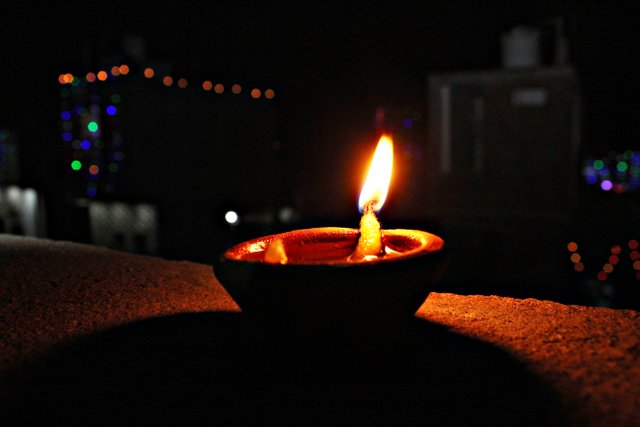Deepawali" and "Dipawali" redirect here. For other uses, see Deepavali (disambiguation).
Diwali
Rangoli decorations, made using coloured fine powder or sand, are popular during Diwali.
Also called Deepavali
Observed by Hindus, Jains, Sikhs,[1] some Buddhists (notably Newar Buddhists)
Type Religious, cultural, seasonal
Significance See below
Celebrations Diya lighting, puja (worship and prayer), havan (fire offering), vrat (fasting), dāna (charity), melā (fairs/shows), home cleansing and decoration, fireworks, gifts, and partaking in a feast and sweets
Begins Ashwayuja 27 or Ashwayuja 28 (amanta tradition)
Kartika 12 or Kartika 13 (purnimanta tradition)
Ends Kartika 2 (amanta tradition)
Kartika 17 (purnimanta tradition)
Date Ashvin Krishna Trayodashi, Ashvin Krishna Chaturdashi, Ashvin Amavasya, Kartik Shukla Pratipada, Kartik Shukla Dwitiya
2023 date November[2]
09 (Govatsa Dwadashi)
10 (Dhanteras/Yama Deepam)
11 (Kali Chaudas/Hanuman Puja/Chhoti Diwali)
12 (Lakshmi Puja/Kali Puja/Naraka Chaturdashi/Sharda Puja/Kedar Gauri Vrat)
13 (Govardhan Puja/Balipratipada/Gujarati New Year)
14 (Bhai Dooj/Vishwakarma Puja)
Frequency Annual
Related to Diwali (Jainism), Bandi Chhor Divas, Tihar, Swanti, Sohrai, Bandna
Explanatory note
Hindu festival dates
vte
Part of a series on
Hinduism
HindusHistoryTimeline
Origins
Traditions
Deities
Concepts
Practices
Philosophical schools
Gurus, sants, philosophers
Texts
Society
Other topics
GlossaryOutline
Hinduism portal
vte
Diwali (English: /dɪˈwɑːliː/; Deepavali[3] (IAST: dīpāvalī) or Divali;[a]) is the Hindu festival of lights with its variations also celebrated in other Indian religions. It symbolises the spiritual "victory of light over darkness, good over evil, and knowledge over ignorance".[4][5][6][7] Diwali is celebrated during the Hindu lunisolar months of Ashvin (according to the amanta tradition) and Kartika—between around mid-September and mid-November.[8][9][10][11] The celebrations generally last five or six days.[12][13]
Diwali is connected to various religious events, deities and personalities, such as being the day Rama returned to his kingdom in Ayodhya with his wife Sita and his brother Lakshmana after defeating the demon king Ravana.[14] It is also widely associated with Lakshmi, the goddess of prosperity and Ganesha, the god of wisdom and the remover of obstacles.[15] Other regional traditions connect the holiday to Vishnu, Krishna, Durga, Shiva, Kali, Hanuman, Kubera, Yama, Yami, Dhanvantari, or Vishvakarman.
Primarily a Hindu festival, variations of Diwali are also celebrated by adherents of other faiths.[12] The Jains observe their own Diwali which marks the final liberation of Mahavira,[16][17] the Sikhs celebrate Bandi Chhor Divas to mark the release of Guru Hargobind from a Mughal prison.[18] Newar Buddhists, unlike other Buddhists, celebrate Diwali by worshipping Lakshmi, while the Hindus of Eastern India and Bangladesh generally celebrate Diwali by worshipping the goddess Kali.[19][20][21]
During the festival, the celebrants illuminate their homes, temples and workspaces with diyas (oil lamps), candles and lanterns.[7] Hindus, in particular, have a ritual oil bath at dawn on each day of the festival.[22] Diwali is also marked with fireworks and the decoration of floors with rangoli designs, and other parts of the house with jhalars. Food is a major focus with families partaking in feasts and sharing mithai.[23] The festival is an annual homecoming and bonding period not only for families,[14][15] but also for communities and associations, particularly those in urban areas, which will organise activities, events and gatherings.[24][25] Many towns organise community parades and fairs with parades or music and dance performances in parks.[26] Some Hindus, Jains and Sikhs will send Diwali greeting cards to family near and far during the festive season, occasionally with boxes of Indian confectionery.[26] Another aspect of the festival is remembering the ancestors.[27]
Diwali is also a major cultural event for the Hindu, Sikh, and Jain diaspora.[28][29][30] The main day of the festival of Diwali (the day of Lakshmi Puja) is an official holiday in Fiji,[31] Guyana,[32] India, Malaysia,[b][33] Mauritius, Myanmar,[34] Nepal,[35] Pakistan,[36] Singapore,[37] Sri Lanka, Suriname, and Trinidad and Tobago.[38]
